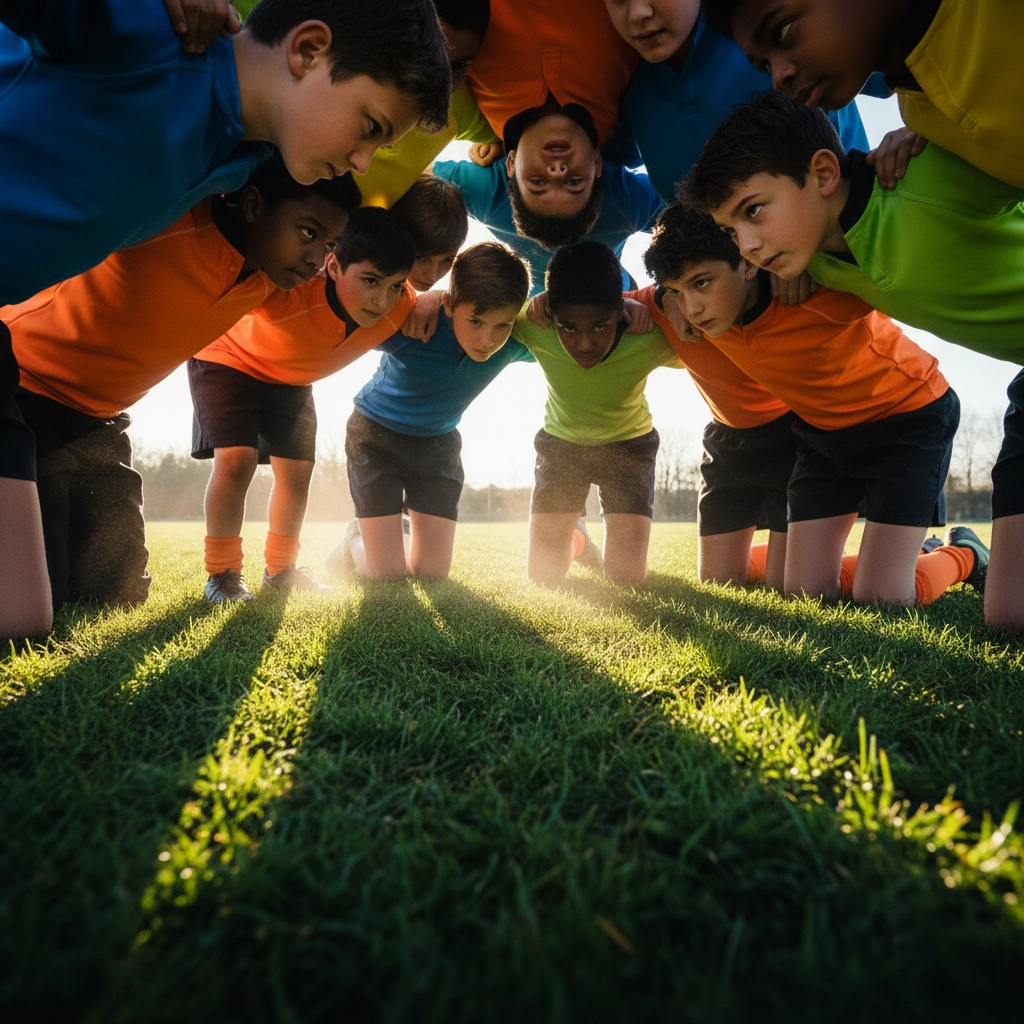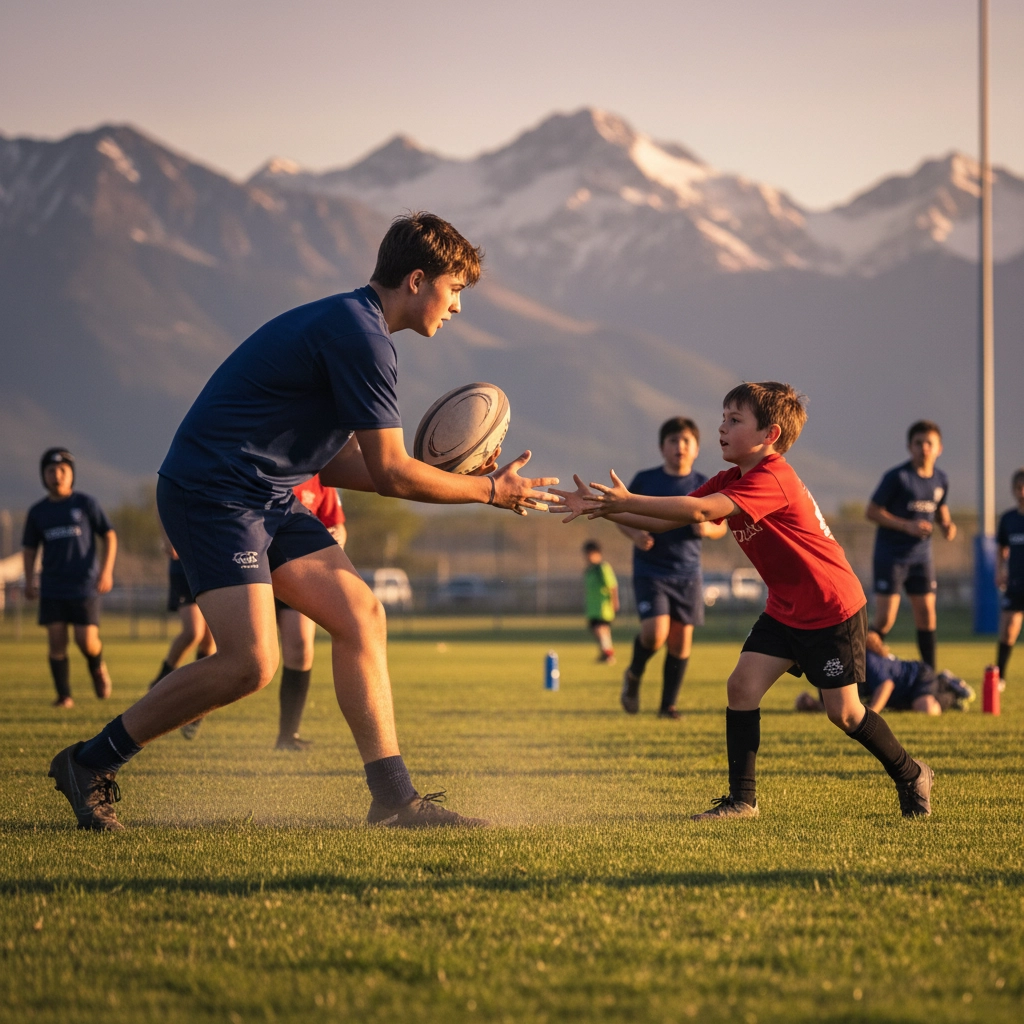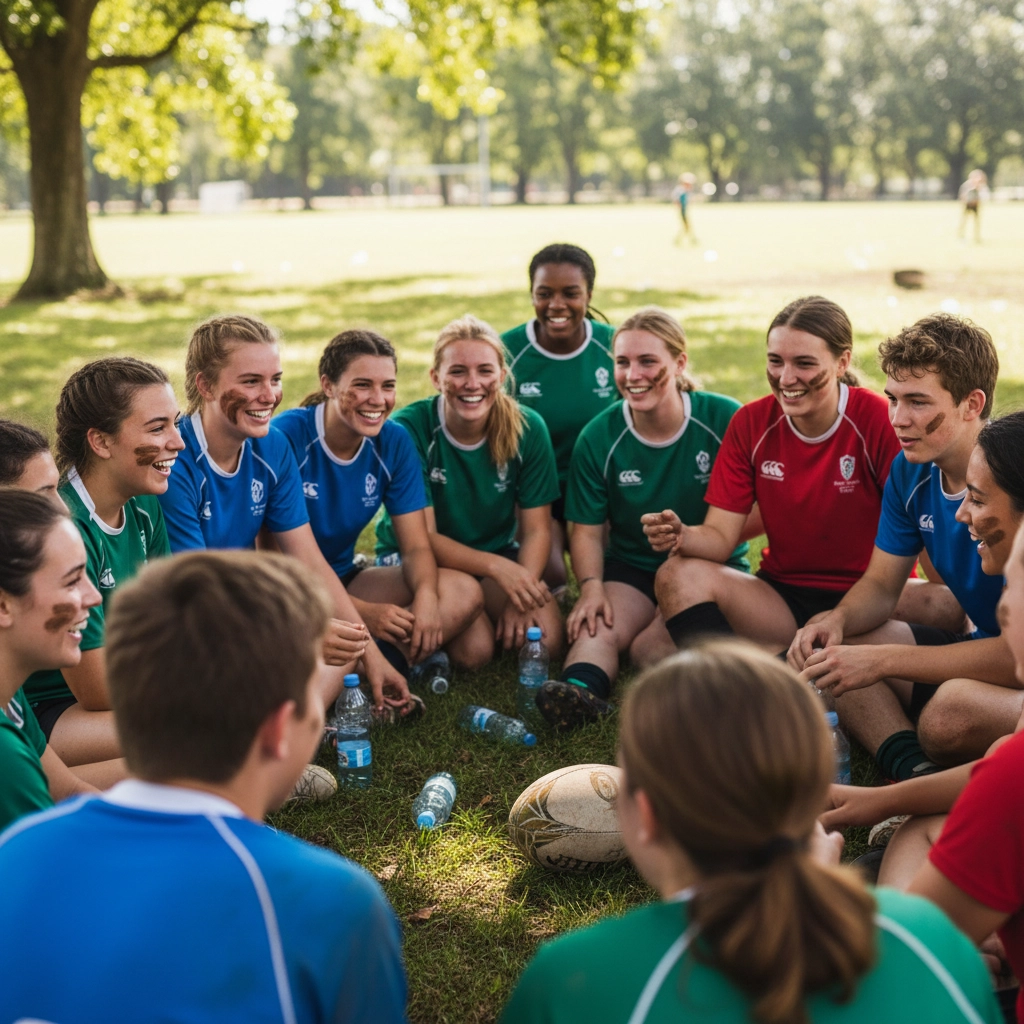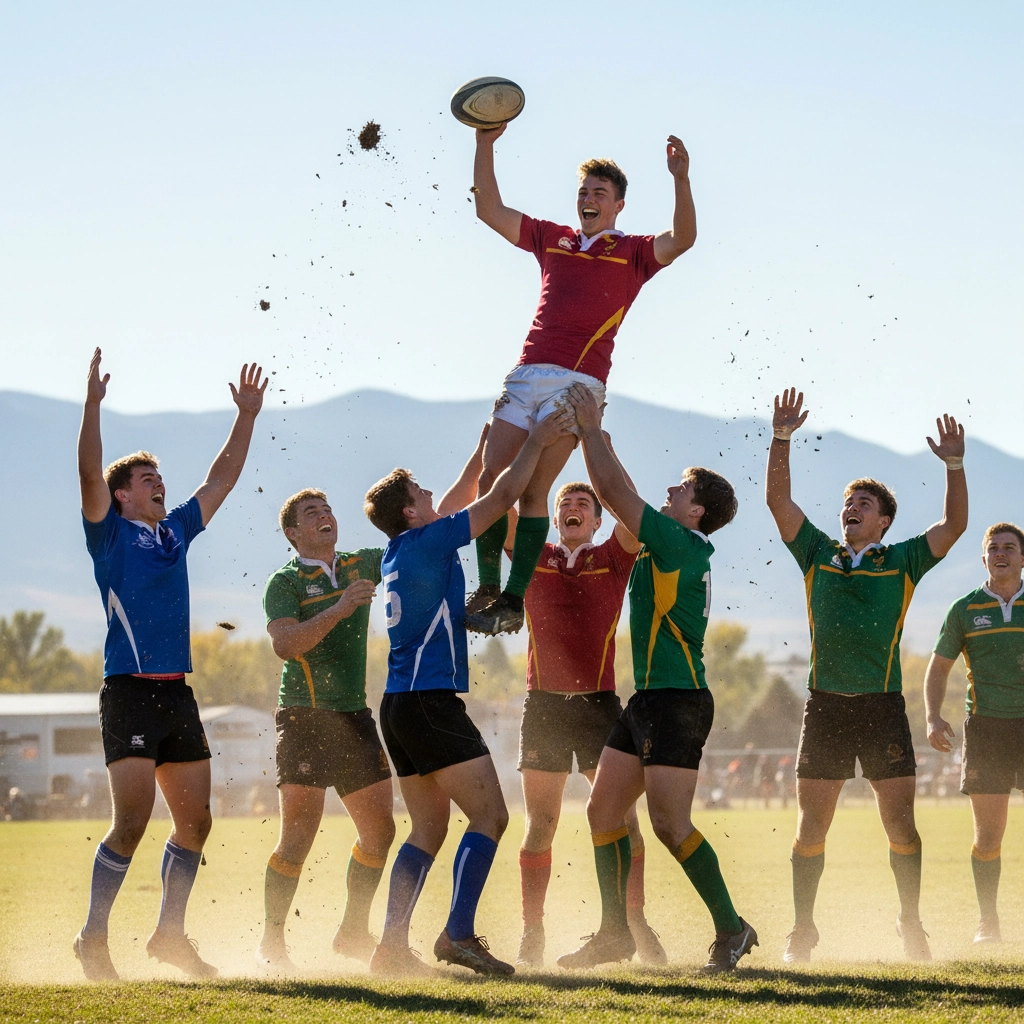The Real Value of Teamwork: How Colorado Rugby Builds Stronger, Happier Kids
- Zoek Web Design
- Sep 29
- 6 min read
Walk into any SAFFA RUGBY training session in Colorado, and you'll witness something remarkable. It's not just kids learning to pass a ball or perfect their tackles: it's young people discovering that they're capable of so much more when they work together than they ever imagined possible alone.
Rugby has this unique way of stripping away the individual ego and building something stronger in its place: genuine teamwork. And here in Colorado, where the rugby scene is exploding, we're seeing firsthand how this team-first mentality is creating not just better players, but happier, more confident kids.
Why Rugby Teamwork Hits Different
Unlike sports where one superstar can carry the entire team, rugby demands that every single player contributes. There's no bench to hide on, no position where you can coast through the game. Each player has a specific role, and success depends entirely on how well they work together as a cohesive unit.

This interdependence creates an environment where kids naturally learn to communicate under pressure, understand each other's strengths and weaknesses, and genuinely support their teammates: even when they're struggling themselves. It's teamwork out of necessity, which makes it incredibly authentic.
"In rugby, you can't win by yourself," explains Sarah Martinez, whose 12-year-old son Jake has been with SAFFA RUGBY for two seasons. "I've watched Jake learn that his success is tied to his teammates' success, and vice versa. It's changed how he approaches everything: school projects, family chores, you name it."
The SAFFA RUGBY Difference
At SAFFA RUGBY, we've taken this natural teamwork foundation and built something deeper around it. Our South African coaching philosophy emphasizes what we call "Ubuntu": the belief that we are who we are because of other people. It's a concept that perfectly captures what we see happening with our Colorado kids.
We don't just teach rugby skills; we cultivate character through teamwork. During our training sessions, you'll see older players naturally mentoring younger ones, kids celebrating teammates' improvements more than their own achievements, and groups problem-solving together when drills get challenging.
Our coaches have spent years developing programming that progresses from teaching fundamentals to high-level skills while maintaining this focus on collective growth. This means a kid doesn't just learn how to make a perfect pass: they learn how to make that pass while encouraging a struggling teammate, communicating with their forwards, and reading what their entire backline needs in that moment.
Real Stories from Colorado Fields
Take Emma Rodriguez, a 14-year-old from Aurora who joined SAFFA RUGBY as a shy eighth-grader. "I was terrified of letting people down," she remembers. "But my teammates made it clear from day one that we succeed together or we learn together. There was no middle ground."
Emma's transformation has been remarkable to watch. She's now one of our team captains, not because she's the most skilled player, but because she's mastered the art of lifting up others. Her mother, Carmen, noticed the change immediately: "Emma started standing up for kids being bullied at school, organizing study groups for struggling classmates, and taking initiative in ways I'd never seen before."

Or consider the story of Marcus Thompson, whose family moved to Colorado Springs last year. As a military kid who'd changed schools multiple times, Marcus struggled with forming lasting friendships. Rugby changed that completely.
"The team became his anchor," says his father, Staff Sergeant David Thompson. "These kids didn't just accept Marcus: they actively helped him settle in, invited him to family barbecues, and made sure he never felt like an outsider. That's not something you can teach in a playbook."
What Parents Are Really Seeing
Parents consistently tell us that the teamwork lessons their kids learn through SAFFA RUGBY show up in unexpected places. Kids are more willing to help with household chores without being asked, they approach school group projects with genuine enthusiasm instead of dread, and they're more patient with siblings.
"My daughter Lucy used to get frustrated when her little brother wanted to 'help' with things," shares Jennifer Walsh from Fort Collins. "Now she sees it as an opportunity to coach him, just like her older teammates do with her. The patience and encouragement she shows him now is incredible."
This shift happens because rugby teaches kids that everyone brings something valuable to the table, regardless of skill level. A newer player might not have the best technique, but they might have the heart to keep pushing when others want to quit. An experienced player might have great skills, but they learn that sharing knowledge makes the whole team stronger.
The Player Perspective
When we ask our SAFFA RUGBY players what teamwork means to them, their answers consistently surprise adults with their depth and maturity.
Sixteen-year-old Alex Chen from Denver puts it this way: "Before rugby, I thought teamwork meant doing your part and not messing up. Now I know it means doing your part while also making sure everyone around you can do theirs better. It's like being responsible for more than just yourself."

Thirteen-year-old Sophia Williams adds, "The best feeling isn't scoring a try. It's setting up a teammate for a try and seeing how excited they get. That feeling is way better than any individual success."
These insights don't develop overnight. They come from countless training sessions where coaches emphasize collective problem-solving, from matches where the team has to adapt together under pressure, and from the rugby culture that celebrates selflessness over showboating.
Beyond the Field: Life Skills That Matter
The teamwork skills our Colorado kids develop through SAFFA RUGBY create ripple effects throughout their lives. They become more collaborative students, more supportive friends, and more empathetic family members.
Teachers regularly tell us they can identify SAFFA RUGBY players in their classrooms: not because they're disruptive, but because they're natural leaders who help create inclusive environments. These kids are the ones volunteering to work with struggling classmates, mediating conflicts between friends, and taking initiative on group projects.
"Rugby players understand that a chain is only as strong as its weakest link," explains Coach Mike Stevens, who's been with SAFFA RUGBY for five years. "So they naturally look for ways to strengthen the whole group instead of just focusing on their own performance."
This translates to academic success too. Studies show that kids who participate in team sports like rugby develop better time management skills, higher self-esteem, and stronger social connections: all factors that contribute to both academic achievement and overall happiness.
Building Resilience Through Shared Struggle
One of the most powerful aspects of rugby teamwork is how it teaches kids to handle adversity together. When the team is losing, when training gets tough, when someone makes a mistake: these moments become opportunities to practice supporting each other under pressure.

"I've watched kids who were ready to quit get lifted up by their teammates and discover they had more in them than they realized," says Coach Stevens. "That's a life lesson you can't get from individual sports."
This shared resilience creates bonds that last well beyond their rugby careers. Many of our former players stay connected through high school and college, continuing to support each other through academic challenges, family difficulties, and major life transitions.
The Discipline of Collective Responsibility
Rugby's team-first approach naturally builds discipline because kids learn that their individual actions affect everyone around them. When a player understands that their teammates are counting on them to show up, train hard, and play their role, they develop an internal motivation that's far more powerful than external pressure.
This isn't punitive discipline: it's collaborative accountability. Kids don't want to let their teammates down, so they push themselves harder, stay more focused, and develop better habits. This sense of collective responsibility carries over into academics, family life, and future career success.
Creating Tomorrow's Leaders
At SAFFA RUGBY, we're not just developing rugby players: we're nurturing the next generation of leaders who understand that true strength comes from lifting others up. The teamwork lessons our Colorado kids learn today will serve them as future business leaders, community volunteers, parents, and citizens.
The real value of teamwork isn't just about winning games or building character: it's about creating young people who believe in the power of collective effort and who have the skills to build strong, inclusive communities wherever they go.
If you're looking for a sport that will help your child discover their potential while learning to value others, SAFFA RUGBY's programs offer something truly special. Come see for yourself how Colorado rugby is building stronger, happier kids through the transformative power of genuine teamwork.

Comments